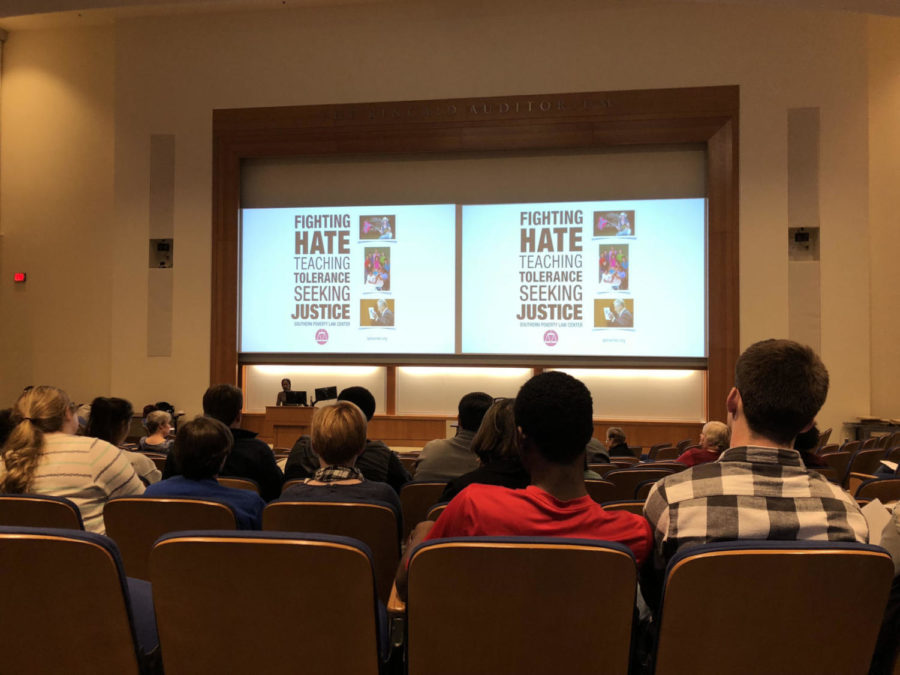SPLC outreach director visits UK to talk about how hate develops
UK students listen as Southern Poverty Law Center Outreach Director Lecia Brooks lectures as part of the “Challenging Campus Communication” series, hosted by the UK College of Communication and Information.
February 1, 2018
To challenge campus communication, the UK College of Communication and Information welcomed the outreach director for Southern Poverty Law Center (SPLC) on Jan. 31.
Lecia Brooks spoke as part of a two-part series called Challenging Campus Communication. The second event is a panel discussion scheduled for Feb. 1 at 7 p.m.
Brooks gave her speech entitled “Hate and Extremism on Campus” in Gatton’s Kincaid Auditorium.
She began by honoring those who fought for social justice in the deep south, including Dr. Martin Luther King Jr., and others.
Brooks connected those figures from the past and the brutal bombing of churches during the Civil Rights Movement of the 1950s and ‘60s to the resurgence in antisemitism today, which is something UK’s community has become familiar with after the defacing of the Jewish Center on campus a few weeks ago.
READ: After vandalism at UK Jewish Student Center, rabbi responds that ‘hate can never beat love’
President Donald Trump’s campaign and subsequent election served as the infrastructure of the lecture, as Brooks cited his dehumanizing comments about Mexicans followed by his Muslim ban as the reasoning for increasing hate in America.
“When there’s an increase in hate rhetoric that’s directed toward a certain group, it produces an increase in actual hate crimes or hate incidents that also target that group,” Brooks said.
Highlighting the emboldened ability to be intolerant through recent political events, Brooks mentioned that elementary schools and college campuses are the most vulnerable to be influenced by targeting groups. For instance, she said that elementary students weaponized Trump’s campaign slogans after his win, targeting other minority students.
The hate-crime statistics from SPLC stated that 50 percent of hate crimes reported were motivated by race or ethnicity, followed by 20 percent that were motivated by religion.
Brooks also commented on the rise in hate groups around the United States; she said there has been a 50 percent increase since 2000. She credits better record keeping for a small part of that increase but still stated that it is reflective of a true growth trend.
Attention was then focused to Kentucky. There are 23 active hate groups, which Brooks said was remarkable for a state that size.
To address the question of why there is such a stark increase in hate crimes and groups, Brooks showed statistics of the changing demographics in the US. In 1970, 83 percent of the nation was white. Today, only 66 percent is. She claimed that the fear of that becoming lower and lower is a driving force for the hate movements seen today.
Individuals are becoming radicalized online, she said, through websites and gaming systems. Many, like Dylann Roof, the Charleston, South Carolina shooter, used resources online to develop bigoted opinions. Hate groups are pulling in students who feel disenfranchised in some way.
Hate groups have also been placing posters on college campuses, encouraging people to follow their message.
For every hate speech, there seems to be a protest on college campuses.
“Students have been protesting since there have been colleges,” Brooks said. “It’s tradition.”
SPLC provides guides for those students for nonviolent, peaceful protests. On its website, students can access pamphlets on how to protest, which also help educate them on supremacist personalities with which they might come in contact.
Students can also gain knowledge on bystander intervention on the SPLC website.
“It informs people on how to engage in certain conversations,” said Chase Cocanougher, a UK senior who attended the event.
More information can be found on the SPLC website.
































































































































































